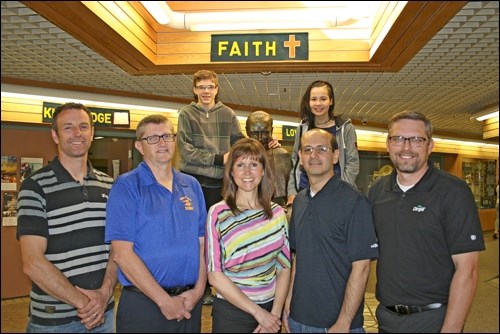An innovative plan to build and operate a greenhouse to plant, grow and cultivate produce to be used, donated or sold by students is being implemented at John Paul II Collegiate in North Battleford.
To that end, external funding of $12,478 has been sought by the school. May 26, a $7,000 cheque was presented by Cargill Ag Horizons and Cargill Animal Nutrition as a major sponsor.
Ames Leslie, regional grain manager with Cargill Ag Horizon, stated the Community Garden Project supports innovative learning, hands-on food resources production that will go to local community support and environmental stewardship, all concepts and actions Cargill supports.
Additional funding is coming from TD Friends of the Environment, $3,978, SIGA, $1,000 and Discovery Co-op, $500.
“The plan is to have the greenhouse operational for the 2017 growing season, starting in March. The proposed size is 12’ x 16’ but that has yet to be finalized,” says teacher Rhea Good.
“The goal is to include students in the planning and building process as much as possible so semester one industrial arts students will have the opportunity to work on the project.”
Good adds they hope to produce fresh herbs, potted plants and bedding plants for sale and for use within the school and possibly other schools as well.
“Some product will be available for sale, and other product will be consumed by staff and students,” says Good.
A release issued by Light of Christ Catholic Schools states, “Food sustainability, the ability to grow one’s own food, and healthy menu planning is critical for our community where 14.3 per cent of our population live in poverty and 13.8 per cent of children live in poverty. Even though agriculture provides one of the largest sources of employment in the area, most students who attend our schools do not grow their own food. Teachers Jeff Kardynal and Rhea Good identified this gap and have responded.”
The release continues, “With the support of Carlo Hansen, principal, and the LOCCS Board of Education, John Paul II Collegiate plans to build a greenhouse to plant, grow and cultivate produce to be used, donated or sold by students. This project was unattainable without seeking external funding.”
The funding that has been committed will be used to support the construction of the greenhouse and purchase of supplies, seed and tools. The greenhouse will be located on the west side of the school.
“Research demonstrates that students who think critically, ask questions, and manipulate, sort, test and investigate materials learn better,” states the release.
“The chance for students to construct a greenhouse and garden space, the resulting product selection and cultivation of produce and the life skills for our functionally integrated students is key to developing knowledge, interest in agricultural practices and a commitment to food and environmental sustainability. The Agriculture Club will create renewed interest in agriculture and environmental science. Long term we believe that more students will choose to pursue studies in environmental science and agriculture and, as a result, remain in Saskatchewan for future employment.”
It is anticipated teachers from other Light of Christ schools will be interested in bringing their students to the greenhouse specifically for the study of life sciences.
“Currently, there is no greenhouse learning space available to students unless they travel by bus to the city greenhouse or to a commercial greenhouse,” states the release.
“This costs considerable money for busing. JPII is within walking distance of three of the four elementary schools located in LOCCS in North Battleford.”
Additional benefits expected include better community relationships, improved student engagement and interest in life sciences, improved life skills and better decision making regarding healthy eating habits.
Learning at the greenhouse will support the Saskatchewan curriculum, which includes outcomes related to: Needs and Characteristics of Living Things; Plant Growth and Changes; Exploring Soils; Structures and Behaviours of Plants; Diversity of Living Things; Interactions within Ecosystems; and Cells, Tissues, Organs and Systems.



